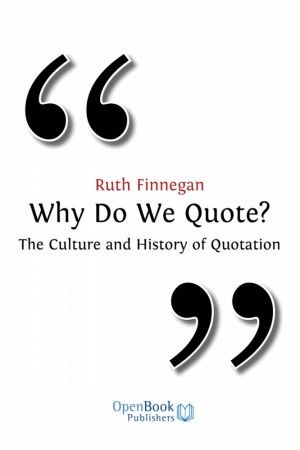Why Do We Quote?
The Culture and History of Quotation
by Ruth Finnegan
DescriptionTable of ContentsDetailsHashtagsReport an issue
Drawing from anthropology, cultural history, folklore, cultural studies, sociolinguistics, literary studies and the ethnography of speaking, Ruth Finnegan's fascinating study sets our present conventions into cross-cultural and historical perspective. She traces the curious history of quotation marks, examines the long tradition of quotation collections with their remarkable recycling across the centuries, and explores the uses of quotation in literary, visual and oral traditions. The book tracks the changing definitions and control of quoting over the millennia and in doing so throws new light on ideas such as 'imitation', 'allusion', 'authorship', 'originality' and 'plagiarism'. 






Book Description
Quoting is all around us. But do we really know what it means? How do people actually quote today, and how did our present systems come about? This book brings together a down-to-earth account of contemporary quoting with an examination of the comparative and historical background that lies behind it and the characteristic way that quoting links past and present, the far and the near.Drawing from anthropology, cultural history, folklore, cultural studies, sociolinguistics, literary studies and the ethnography of speaking, Ruth Finnegan's fascinating study sets our present conventions into cross-cultural and historical perspective. She traces the curious history of quotation marks, examines the long tradition of quotation collections with their remarkable recycling across the centuries, and explores the uses of quotation in literary, visual and oral traditions. The book tracks the changing definitions and control of quoting over the millennia and in doing so throws new light on ideas such as 'imitation', 'allusion', 'authorship', 'originality' and 'plagiarism'.
This open book is licensed under a Creative Commons License (CC BY-NC-ND). You can download Why Do We Quote? ebook for free in PDF format (4.7 MB).
Table of Contents
Part I
SETTING THE PRESENT SCENE
Chapter 1
Prelude: a dip in quoting's ocean
Chapter 2
Tastes of the present: the here and now of quoting
Chapter 3
Putting others' words on stage: arts and ambiguities of today's quoting
Part II
BEYOND THE HERE AND NOW
Chapter 4
Quotation marks present, past, and future
Chapter 5
Harvesting others' words: the long tradition of quotation collections
Chapter 6
Quotation in sight and sound
Chapter 7
Arts and rites of quoting
Chapter 8
Controlling quotation: the regulation of others' words and voices
Part III
DISTANCE AND PRESENCE
Chapter 9
What is quotation and why do we do it?
Appendix 1
Quoting the academics
Appendix 2
List of the Mass Observation writers
Book Details
Title
Why Do We Quote?
Subject
History
Publisher
Open Book Publishers
Published
2011
Pages
350
Edition
1
Language
English
ISBN13
9781906924331
ISBN10
1906924333
ISBN13 Digital
9781906924355
ISBN10 Digital
190692435X
PDF Size
4.7 MB
License

Related Books

This book will challenge widespread assumptions about Hippocrates (and, in the process, about the history of medicine in ancient Greece and beyond) and will also explore the creation of modern myths about the ancient world. Why do we continue to use Hippocrates, and how are new myths constructed around his name? How do news stories and the internet...

Musical Cities represents an innovative approach to scholarly research and dissemination. A digital and interactive 'book', it explores the rhythms of our cities, and the role they play in our everyday urban lives, through the use of sound and music.
Sara Adhitya first discusses why we should listen to urban rhythms in order to design ...

We've all heard it: according to Hal Varian, statistics is the next sexy job. Five years ago, in What is Web 2.0, Tim O'Reilly said that "data is the next Intel Inside." But what does that statement mean? Why do we suddenly care about statistics and about data? This report examines the many sides of data science - the technologi...

Why do we play games and why do we play them on computers? The contributors of Games and Rules take a closer look at the core of each game and the motivational system that is the game mechanics. Games are control circuits that organize the game world with their (joint) players and establish motivations in a dedicated space, a "Magic Circle,&qu...

You read about it every day: How can we create a sustainable, reliable and affordable energy supply? Does a local water supply play a role in this? Why don't we drive hydrogen cars that are powered by the sun and rain? The availability of cheap green energy is increasing. . We have solar and wind power, and even energy derived from ambient hea...

While many resources for network and IT security are available, detailed knowledge regarding modern web application security has been lacking - until now. This practical guide provides both offensive and defensive security concepts that software engineers can easily learn and apply.
Andrew Hoffman, a senior security engineer at Salesforce, intro...

